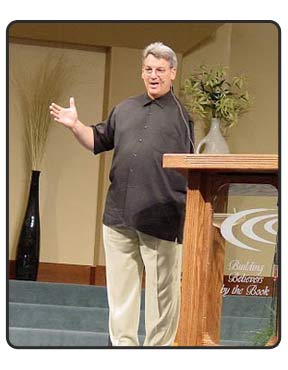Biblical Truth That Assuages Depression
My last post described a courtroom scene and clarified the implications of the doctrine of justification. In this post, I tell a story and explain another implication of the cross that assuages despondency.
I’m not saying that meditating on doctrine eradicates all depression, but I can testify that knowing what Jesus accomplished for us—clarifying our identity in Christ—increases the likelihood that His truth will seep from our head into our heart. At the very least, truths like this sustain us and alleviate to some extent the burden of despondency.
What I heard Stuart Briscoe say in 1972 is true: “Spiritual experience begins in the mind” (Rom. 12:2).
 Life Pitched Him A Curve
Life Pitched Him A Curve
It happened to Dave Dravecky, an effective left-handed pitcher for the San Francisco Giants of the National League in pro baseball—way back in the late 1980s. Dravecky and his wife are also strong Christians.
The type of wicked curve ball he was known for was thrown at him: a diagnosis of cancer in the upper left arm. The surgeon who removed the cancerous lump, and part of his arm muscle, told him he would never pitch baseball again.
Yet he beat the odds, made a comeback through the minor leagues, and joined the Giants again in the summer of 1988. He even wrote a Christian-themed book the year he returned to pro ball: Comeback.
Dave won his first start in August of 1988, pitching eight strong innings. During his second start of the major league comeback, he threw a pitch in the sixth inning and immediately collapsed on the mound. The bone in his left arm snapped. The muscle that remained just wasn’t strong enough to handle the ongoing stress of pitching.
A more sobering diagnosis followed: return of the cancer. This time, the surgeon amputated not only Dave’s left arm, but part of his shoulder.
In a second book titled When You Can’t Come Back, Dave described a bizarre phenomenon often experienced by amputees: phantom pain. ( I slightly edited his words, but did not change any of his meaning.)
“I went home after six days in the hospital. That’s when I began experiencing severe phantom pains. Though my arm was gone, I still felt pain where my arm used to be. I’d get burning sensation in the fingertips of my left hand, which of course was no longer there. The pain required a strong prescription to subdue.
“Though the nerves in my left arm had been severed, the nerve pathways from my brain, running down my spinal cord, and heading to the area where my arm used to be, were still functioning.
“A few weeks later I was being interviewed by a lady from the TV show, ‘Good Morning, America.’ During that interview, the pains badgered me. It felt like someone was using a fork and jabbing it into my left hand.”
Phantom Pain Haunts Some Christians
A phenomenon similar to Dravecky’s phantom pain happens to some believers in Christ. Except their pain isn’t physical.
Their memory banks have a hard time forgetting past sins they committed. They still feel self-reproach or burdensome guilt, even in relation to sins they’ve confessed and abandoned. What they feel is a type of emotional or psychological phantom pain.
They condemn themselves despite the fact, as far as God is concerned, the source of the pain no longer exists. The incident or failure that spawned their guilt feelings is not in the portrait of them that God sees. Just as surely as Dave’s left arm is gone, their wrong choice or moral lapse is gone permanently from God’s record books, removed by the blood Jesus shed on the cross.
God’s Word offers extra-strength pain relievers for those of us who still feel weighted down by past sins.
*”In Him we have redemption through His blood, the forgiveness of our trespasses, according to the riches of His grace” (Ephesians 1:7).
*”He has not dealt with us according to our iniquities. For as high as the heavens are above the earth, so great is His lovingkindness toward those who fear Him. As far as the east is from the west, so far has He removed our transgressions from us” (Psalm 103:10-12).
*”When you were dead in your transgressions…He made you alive together with Him, having forgiven us all our transgressions” (Colossians 2:13).
*”Having been justified by faith, we have peace with God through our Lord Jesus Christ” (Romans 5:1).
If we’ve put our faith in Christ, we’re forgiven. Even forgiven sins may have painful consequences, but continuing to feel the phantom pain of self-reprisal isn’t necessary. Jesus’ death satisfied the justice of God, which insists that sin be punished. When we put our faith in Him, we, too, are acceptable to God, since His righteousness was credited to us. When we doubt our acceptability to God as Christians, in effect we are doubting Jesus’ acceptability to the Father.
The verb form of the most common Greek term for “to forgive” means “to send away, to release, to let go.” When we trusted Jesus for our salvation, God the Father sent away or released our past sins so we no longer have to carry around their weight.
Soli Deo gloria! (Glory to God!)
If you have a difficult time forgiving yourself for past sins, memorize the verses I employed late in this post.
Dave Dravecky has a website where you can learn more of his story and see his speaking engagements.


It’s remarkable for me to have a site, which is beneficial in favor of my experience.
thanks admin http://websoikeo.com
Thanks!
Hey there! I’ve been reading your web site for some time now and finally got the bravery to
go ahead and give you a shout out from Dallas Tx! Just wanted to mention keep up the great work!
Thanks for your kind comments.